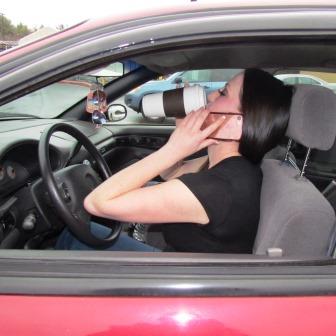
Despite public awareness campaigns about the dangers of using a cellphone while driving, industry experts report American drivers are ignoring the cautions.
People love their smartphones. You can talk on the phone, you can text, check emails, take photos and videos, even go on the internet and do pretty much everything you used to have to do at a clunky desktop computer. What happens when the smartphone addiction continues behind the wheel?
Problems come up, big problems according to the experts because talking, texting and all of those smartphone uses are on the increase. Despite various public awareness campaigns, smartphone use behind the wheel has increased, not decreased. Medical research finds even simply holding a conversation while driving decreases brain activity required for making driving decisions.
Dangers of Using Cellphone While Driving
Insurance companies and others worry about drivers using multiple smartphone functions while driving, causing a growing danger on the highways.
“Distracted by their smartphones, America’s drivers are becoming more dangerous by the day.”
Wall Street Journal, page 1, Feb. 21, 2017.
Smartphone uses including texting, talking, even going on the internet and using the camera while driving continue to increase. Using the cellphone while driving breaks down into numerous dangers.
How Drivers are Using the Cellphone While Driving
Those who track driver behavior see the following specific growing dangers:
- 36% of drivers surveyed admitted to texting while driving.
- 29% admit to accessing the internet behind the wheel.
- 20% say they’ve taken pictures while driving.
- 10% admit they have taken video while operating a motor vehicle.
State Farm Insurance Company, a major U.S. auto insurance company found all of the above alarming statistics in a survey. The numbers are up from their earlier research.
Smartphones Causing Higher Auto Insurance Rates?
Auto insurance companies worry that the number of U.S. traffic accidents is on the rise. This trend reverses lower accident rates in the early years after the year 2000. Higher accident rates mean more money paid out by auto insurers on claims. That means auto insurance rates also go up.
Insurance industry analysts predicted auto insurance rates would decrease as car manufacturers increasingly added anti-collision, autonomous features to cars. But the trade group Insurance Information Institute reports the opposite. In fact the cost of the average U.S. car insurance policy increased 16% from 2011 to 2016. At least one insurance company, Horace Mann, expected to increase auto insurance policy rates by 8% in 2017.
Insurance companies claim the steady rate increases may be caused by the widespread and increasingly habitual use of smartphones behind the wheel.
Reasons for Increasing U.S. Traffic Accidents
Factors other than using the cell phone while driving could underlie the increase in U.S. traffic accidents. Lower gas prices and a generally improved U.S. economy both add more drivers and vehicles to highway traffic. Congested highways lead to less reaction time for drivers looking at their phones and not the road. Plus the simple fact of more vehicles on the road leads to more traffic accidents.
No doubt, texting and other smartphone use steal attention away from the driver of any motor vehicle. For example, in the time it takes a driver to look down at a cellphone and read a text, an average of 4.6 seconds, at 55 miles an hour, the vehicle travels the length of a football field. Click here for more info.
Confirming a direct cause-and-effect link between distractions including smartphone usage, and the increase in traffic accidents proves difficult. Hammering down that link presents challenges. After all, few drivers admit to the other driver, police or their insurance company that they were fiddling with the smartphone at the moment of the accident.
Troubling Evidence from Using Cellphone While Driving
Signs of distracted use of the cellphone while driving abound. One insurer reported to its investors in late 2016 that it now sees many car accidents with no skid marks. That means drivers occupied with the smartphone fail to see sudden dangers, and fail to take evasive actions that may either avoid a collision, or at least reduce the extent of damage.
“Driving while talking on cell phones – handheld and hands-free – increases risk of injury and property damage crashes fourfold.”
Understanding the Distracted Brain, National Safety Council, White Paper, April 2012.
Clear dangers raised by using the cellphone while driving do not come only from such distracting uses like taking pictures or surfing the internet behind the wheel. Merely talking, even hands free, reduces attention on the road. One study found that listening to conversation robbed 37% of brain activity in the part of the brain used for driving. Using brain MRI studies, researchers concluded that this actually takes too lightly the impact of simply talking on the cell phone while driving.
Sources:
Smartphone Use is Driving Traffic Accident Numbers and Car Insurance Rates Up, Study Clams. Wall Street Journal, Page 1, Feb. 21, 2017
Smartphone Addicts Behind the Wheel Drive Car Insurance Rates Higher, PhoneArena.com, Feb. 21, 2017.
Understanding the Distracted Brain, Why Driving While Using Hands-Free Cell Phones is Risky Behavior, National Safety Council, White Paper, April 2012.
Views: 7




